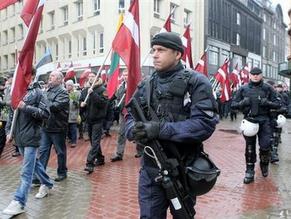|
World Jewish News

The controversial annual march honours Latvia's troops who fought the Soviets under the banner of Nazi Germany during World War II.
|
Latvian capital bans controversial Nazi march
07.03.2012, Jews and Society Latvia's capital said it was banning demonstrations on March 16, the date of a controversial annual march honouring the Baltic state's troops who fought the Soviets under the banner of Nazi Germany during World War II.
Riga city council said it had received applications from eight different organisations that want to stage demonstrations and counter-demonstrations on the date, but had rejected them all.
The blanket ban had been imposed to "avoid possible provocations and threats to public security," the council said in a statement.
Latvia attracts international attention -- and condemnation, notably from Russia and Jewish groups -- every March 16 for a parade that pays tribute to the Latvian Legion, a combat unit of Nazi Germany's Waffen-SS.
The ban is expected to be challenged in court but whatever the result, the parade and protests are likely to take place with or without official sanction, as in recent years.
Latvian President Andris Berzins has called criticism of the Legion and the March 16 rally an attempt to "blacken the reputation of the Latvian state".
Berzins said that veterans of the 140,000-strong World War II force were conscripts but were driven by the ideal of defending Latvia against the Soviets, and were not war criminals.
The Soviets seized Latvia in June 1940 under a pact with the Nazis. It broke down in June 1941 when Germany invaded Soviet territory.
German troops were hailed by some Latvians as liberators. Only a week before they arrived, the Soviets had deported 15,000 Latvians to Siberia.
But the Nazis brought their own terror, killing 70,000 of Latvia's 85,000 Jews, helped by local collaborators.
Legion veterans underline that it was founded in a move to stem a Soviet advance in 1943, after most of Latvia's Jews had been slaughtered, arguing they cannot be held responsible.
The Legion was a mixture of volunteers and conscripts. Roughly a third died in combat or Soviet captivity.
Another 130,000 Latvians sided with the Soviets. Almost a quarter were killed, many in battles with their Legion compatriots
As the war's tide turned, the Soviets captured Riga in October 1944.
Latvia regained independence in 1991 and joined the European Union in 2004.
EJP
|
|
